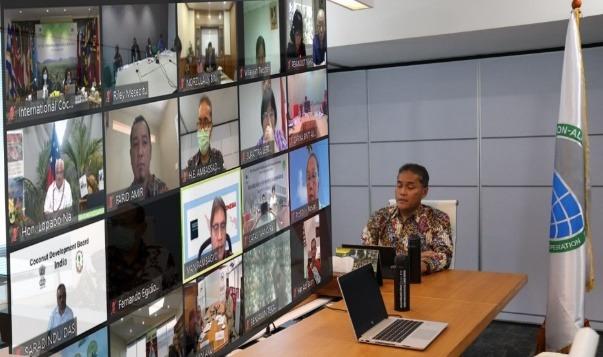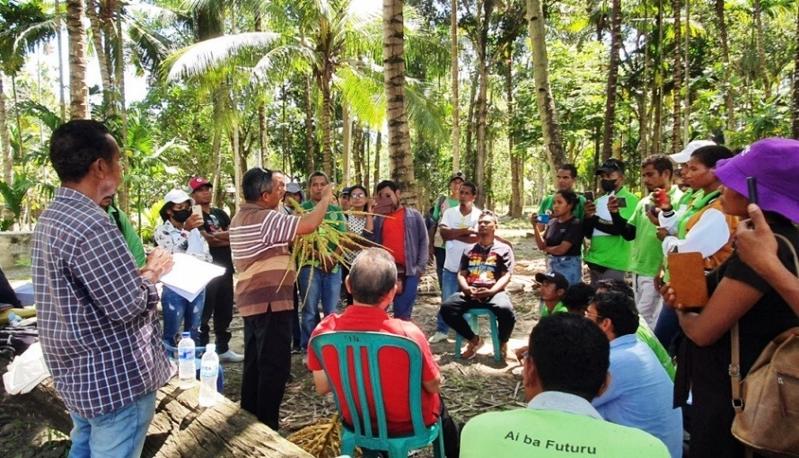 This file photo taken in November, 2020 shows NAM CSSTC Director Diar Nurbintoro speaking during a virtual ministerial meeting of the International Coconut Community (ICC). (PHOTO PROVIDED TO CHINA DAILY)
This file photo taken in November, 2020 shows NAM CSSTC Director Diar Nurbintoro speaking during a virtual ministerial meeting of the International Coconut Community (ICC). (PHOTO PROVIDED TO CHINA DAILY)
A leading official from the Non-Aligned Movement (NAM) has called on greater support from China and other parties for the improvement of the welfare of people in NAM member countries, under the South-South Cooperation scheme.
“We have held talks with the World Bank, UNDP, officials from the Chinese embassy, and others for such cooperation,” said Diar Nurbintoro, director of the Non-Alignment Center for South-South Technical Cooperation (CSSTC) on May 19.
Further talks with those parties had yet to be held, Nurbintoro told a seminar on “Indonesia’s public diplomacy with NAM in navigating international political dynamism”.
Jakarta’s LSPR Communication and Business Institute, one of Indonesia’s leading graduate universities, organized the discussion forum that brought in professors, students and Indonesian diplomats.
Founded in 1961 during the Cold War era, the NAM played a crucial role in decolonization and the formation of new independent states. It also fought for the democratization of international relations.
READ MORE: China, Pacific Island nations cooperation potential to be unleashed
Indonesia with its “free and active” foreign policy played a notable role in the inception of the NAM. The Asia-Africa Conference in Bandung, Indonesia, in 1955, which was initiated by Indonesia’s first president Sukarno, provided a foundation for the NAM which held a confrontational stance against Western powers.
While China is now striving to develop diplomatic relations with Pacific Islands, Nurbintoro said the world’s second-largest economy could also support the CSSTC’s welfare programs in the area, in addition to countries in Africa
Confrontation has given way to more peaceful and active initiatives like the CSSTC, which was proposed at the NAM Summit in Jakarta in 1994 by Indonesian President Suharto. The CSSTC was founded in 1995 by Suharto and the King of Brunei, with its Jakarta headquarters opening in 1998.
While the center was initially funded by the government of Brunei Darussalam, the CSSTC is now funded solely by the Indonesian Agency for International Development, from a grant that is included in the state budget.
The CSSTC is meant for capacity-building projects for needy countries among the 120-member NAM, which includes China and other Asian giants like India and Japan.
Nurbintoro, a former ambassador, said after the seminar that he is optimistic that China and the other parties would lend a helping hand.
“As for China, its contribution might be small for itself but it would be meaningful for us,” he said.
 Participants take part in a training session for a coconut replanting program organized by the NAM CSSTC in cooperation with the Indonesian embassy in Dili, Timor Leste's Ministry of Agriculture and Fisheries, and the International Coconut Community (ICC), in Timor Leste, in October 2022. (PHOTO PROVIDED TO CHINA DAILY)
Participants take part in a training session for a coconut replanting program organized by the NAM CSSTC in cooperation with the Indonesian embassy in Dili, Timor Leste's Ministry of Agriculture and Fisheries, and the International Coconut Community (ICC), in Timor Leste, in October 2022. (PHOTO PROVIDED TO CHINA DAILY)
He added that Indonesian Foreign Minister Retno Marsudi had asked them to seek additional funding sources beyond the Indonesian government for CSSTC’s project expansion plans.
They include agricultural, fishery, and small- and medium-enterprise development projects that need technical assistance from CSSTC. So far, the center has mainly carried out training for trainers from the Pacific Islands and Africa. Experts from Indonesia’s ministries and universities have carried out the training.
ALSO READ: High-level seminar calls for new heights in China-Africa ties
For Pacific countries such as Fiji, Palau, and Indonesia’s neighbor Timor Leste, rejuvenation and replanting coconut trees are the most needed and the most popular among CSSTC’s assistance programs.
Timor Leste President Jose Ramos Horta recently asked the CSSTC to help push for major changes in coconut production in his country by supporting hybrid coconut plantations. Such hybrid coconut trees are five meters tall at the most and take just three years to bear fruit, Nurbintoro said.
READ MORE: Green ties to deepen partnership with Africa
While China is now striving to develop diplomatic relations with Pacific Islands, Nurbintoro said the world’s second-largest economy could also support the CSSTC’s welfare programs in the area, in addition to countries in Africa.
Lecturer and former ambassador Aloysius Lele Madja agreed, saying that the Indonesian government should persuade China to support NAM countries through the CSSTC office and not let it do that task alone.
Also speaking at the May 19 seminar, Madja suggested that the contribution expected from China be discussed in three-party meetings involving the Chinese government, the Indonesian government, and the CSSTC office.
Madja added that the NAM is still relevant today even as the world is becoming more multipolar.
“It is mainly because in current global competitions countries give priority to their own interests only,” he said.
The writer is a freelance journalist for China Daily.


